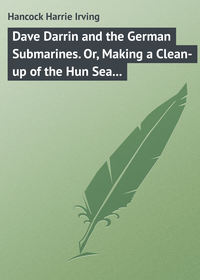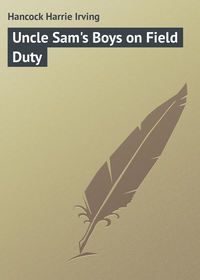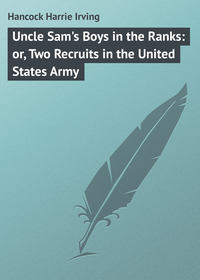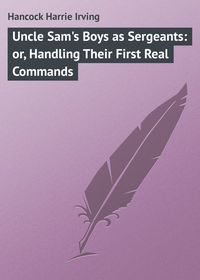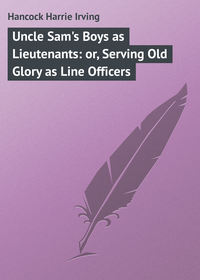 полная версия
полная версияThe Motor Boat Club at the Golden Gate: or, A Thrilling Capture in the Great Fog
Cragthorpe was enough himself, by this time, to understand. He scowled blackly, but refused to speak.
"Take him along down below to the brig, now," ordered Captain Halstead.
As the three navigators and their captive stepped out forward of the pilot house, Tom pointed over to port.
"There's the boat of your friends, my man," laughed the young motor boat skipper. "You've told me, too, that Frank Rollings is aboard of her, and that he has the stolen funds with him. Oh, one way and another, you told me a lot this night that I'm glad to know!"
Cragthorpe uttered some savage language under his breath as he was dragged below. Once again he found himself in the brig, and the door locked, after the leg-irons had been fitted. This time, to make doubly sure of his man, Halstead put on a double lock by means of a chain and padlock, the latter being of a pattern that could not be picked.
"In one way I almost feel badly at doing this to you, Cragthorpe," Tom said to the fellow, through the grating. "You'll think I'm crowing over you, and abusing my power. I'd be easier with you – but it wouldn't be safe for anyone aboard the yacht."
Halstead then returned to his cabin, where, at his desk, he wrote a note to Mr. Baldwin, advising the latter of what he had learned from the man who was once more in the brig.
This note he turned over to Mr. Costigan.
"Hand it to him if he comes on deck in the morning before I do," requested the young skipper. "Add anything you please, out of what you saw and heard to-night."
Then the motor yacht captain walked over to the port rail for one more look at the "Victor." The "Panther" was still keeping abreast of her, less than four hundred yards away. These two craft appeared to have the sea all to themselves.
"When, where and how will this all end?" wondered Tom Halstead.
Then he turned in once more, this time hoping for some real rest.
CHAPTER XVIII
A TRICK MADE FOR TWO
Just before eight o'clock in the morning Tom Halstead rolled over luxuriously in his broad bed.
"One more catnap wouldn't feel half bad," he muttered to himself. "However, I reckon I feel about right. I've had some of the sleep that was coming to me."
Then:
"I wonder how my friend Cragthorpe is this morning? It's quite plain he hasn't found some other trick for getting out of the brig."
Tom yawned a couple of times, stretched, and finally decided that he felt like getting up.
While he was coming to this conclusion the whistle sounded in the bridge speaking tube.
Springing out of bed, Tom took up the mouth-piece.
"Well?" he called.
"The 'Victor' is putting about, sir."
"What's her new course?"
"Going right back over the course she came out on, sir. Shall I turn and follow?"
"What else? The only thing we're living for now, Mr. Costigan, is to keep close to that steam yacht. Follow her, without further orders, even if she starts to steaming in circles. I'll be out soon."
"Very good, sir."
Tom looked slowly about him, then headed for the bath-room. He took plenty of time in the warm water, finally dressing. Mr. Costigan's watch had gone below, the third officer having left Tom's letter with Dick Davis, to be handed to Mr. Baldwin when the latter should appear. But, so far, none of the cabin party had yet turned out.
"All our people are still abed, I think, sir," smiled Davis, when the young motor boat captain appeared on deck.
"They've been worn out, by the suspense as much as by their short hours of rest," Halstead replied.
"Now, you guess why the steam craft has put about, don't you?" asked Halstead, after pacing the bridge for some moments while he studied the weather.
"I'm not sure that I do, sir," Dick admitted, after a moment's thought.
"Within three or four hours, I'm willing to wager you a night's rest, we'll be back in the fog belt," Tom replied, pointing ahead. "Now, Rollings and the captain of the 'Victor' have felt that they were getting too far off the course to their real destination, with us tagging right alongside all the way. They knew that the fog bank was a few hours astern of them as they lay on the other course, so they're putting back to get into it."
"For what purpose?" asked Dick.
"Why, I suppose they've figured on some plan for losing us in the fog this time. That's the way their hopes run, anyway."
"I can't see any fog ahead of us, sir," proclaimed Dick. "And I thought a fellow raised on the Maine sea-coast knew all about fogs."
"There's Ab just coming up for the day's work," whispered Tom, as the young first officer appeared through the companionway forward. "Just hear what he says."
Leaning forward over the bridge rail, Halstead called:
"Mr. Perkins, what sort of weather do you think lies ahead of us?"
Ab halted, looking all about him, then peering out for some moments past the bow of the "Panther."
"I think, sir," came the first officer's report, at last, "we're heading back towards another real old San Francisco fog."
"I surrender, then," nodded Dick Davis.
"We'll be in it by noon, or before," Tom Halstead predicted.
"And then, the folks on that craft yonder have it all figured out to give us the slip, sure and easy this time," muttered Ab, as he climbed the steps to the bridge.
Out of the owner's quarters stepped Joseph Baldwin and came forward, stretching and inhaling deeply the outdoor air. Captain Tom Halstead stepped down from the bridge to meet him.
"Haven't the other crowd changed their course a bit?" asked Mr. Baldwin.
Halstead explained the new move on the part of the navigator of the "Victor."
"Going to try to lose us, are they?" chuckled Baldwin. "If they do, Captain, they are clever people. If they can get away from you I'm positive it won't be your fault."
Then, stretching like a man who has had a fine, long sleep, and who isn't yet over the enjoyment of it, the owner added:
"Thank goodness, nothing happened during the night!"
"Nothing happened in the night, eh? I'm glad it was all carried off so quietly, sir, that you weren't disturbed by it."
"Why, did anything happen?"
"The fire, in the first place – "
"Of course; but I meant, nothing after I turned in again."
"Something certainly did happen," laughed Halstead. "I left a note for you with the watch officer, in case you came on deck before I did. Now, however, I can tell you about it."
And that Tom Halstead proceeded to do. While he was still engaged in the narration Mr. Ross came up on deck, and had to hear the tale. Just at its finish Dr. Gray appeared, followed by Gaston Giddings. The latter young man, though wholly out of the influence of morphine now, looked seedy and sullen. Plainly, he resented his enforced abstinence from drugs.
"I want to see that infernal rascal, Cragthorpe," muttered Mr. Baldwin. "Captain, won't you be good enough to have him brought on deck?"
So Ab was summoned, and instructed to take the extra seaman of the watch, as well as Quartermaster Bickson, and bring the prisoner to deck.
"Bring him by force, if you have to," added Captain Tom, dryly.
In a short time the quartermaster and seaman appeared, all but dragging Cragthorpe, while Ab Perkins brought up the rear of the procession, giving the doubly manacled fellow an occasional shove.
It was the first time that Gaston Giddings had seen the prisoner. The instant he did so, now, the young bank president looked suddenly angry.
"Mr. Baldwin," demanded Gaston Giddings, "why is this gentleman under such restraint?"
"Gentleman?" demanded Baldwin, with withering scorn. "Why, my boy, about whom are you talking?"
"Why is Mr. Cragthorpe ironed, on board this yacht?" insisted Giddings, his face now white and stern with increasing anger.
"Well, then, I'll tell you," sniffed Joseph Baldwin. "That fellow is in irons because he joined us from the 'Victor.' His first enterprise on board was to try to put one of our motors out of the running. His next effort was to set this yacht on fire, last night. After that, he broke into Captain Halstead's cabin, presumably with the intention of killing the navigator of this yacht; at any rate, he meant to injure Captain Halstead severely. Those are some of the reasons, Giddings, my boy, why Cragthorpe is now guarded as carefully as a mad dog might be if we didn't possess the right to kill it."
While speaking, Joseph Baldwin studied the young bank president's face keenly. After a pause, the older man went on:
"And now, Giddings, if you concede that I have any right to be curious, in turn, I'd like to ask you why you are so intensely interested in this scoundrel?"
From the instant Cragthorpe had caught sight of the face of Gaston Giddings, the man in irons had stood more at ease, a sneer on his face.
"Cragthorpe is a friend of mine," replied Giddings, stiffly.
"Indeed? Then I regret to say that I can't congratulate you on your choice of friends."
"I demand that you set Mr. Cragthorpe free!" cried young Giddings, in a voice passionate with anger.
"That's a request, my boy, that I'm not at all inclined to grant, even had I the power," retorted Baldwin, coolly, yet speaking as though he did not wish needlessly to further rouse the anger of Giddings. "You see, I haven't any power to give the order."
"No power?" snorted Giddings. "Don't you own this yacht?"
"I do; but Halstead is her captain. It is one of the rules of the sea that, after a vessel leaves her anchorage, her captain commands her absolutely until port is again reached."
"Do you mean to say that this boy would refuse to free Cragthorpe, if you commanded it?" demanded Giddings, hotly, a flushed spot burning in either cheek.
"What would you say, Captain Halstead, if I demanded the release of the prisoner?" asked Baldwin, facing the young motor boat skipper with smiling eyes.
"I'd refuse, sir," Tom replied, promptly. "In my opinion the 'Panther' isn't safe a minute when Cragthorpe is out of the brig. Take the prisoner back to the brig, Mr. Perkins."
Gaston Giddings, with a wrathful cry, started forward, but Tom blocked his way.
"You know you're pleasing the owner you sail for, or you wouldn't dare do this thing," choked the young bank president.
The prisoner was speedily taken below.
Gaston Giddings stamped angrily aft, while Joseph Baldwin's eyes followed the young man with a wondering look.
"Mr. Perkins," directed Tom, when Ab came back on deck, "lock the door of the passage leading to the brig, and leave the key with the watch officer, with instructions to turn it over to his successor on the bridge." Tom's order was given for the purpose of preventing Giddings from making any attempt to reach and aid Cragthorpe.
"I'm going to have Doc Gray try to find out what part Cragthorpe has been playing in the life of our young friend, Giddings," Mr. Baldwin confided to the young skipper. "I've a suspicion, already, though."
"May I ask, sir, what you suspect?"
"Well, since Giddings has become a confirmed 'hop-fiend,' and Cragthorpe comes to us from the Rollings crowd, I think it most likely that Rollings has been employing Cragthorpe to cultivate Giddings's acquaintance and lure him on into the opium habit. Such drugs destroy a man's will, his sense of justice – they rot his very soul!"
"So, then, sir, you think Rollings has been, for some time, engaged in a deliberate plot to acquire an ascendancy over Mr. Giddings and ruin him?"
"That's my suspicion, stated in a few words, Captain."
Through the forenoon the chase on the course back to San Francisco continued without change. By eleven o'clock both yachts were moving through occasional light blotches of fog, though the two craft still moved in sight of each other. An hour later, however, the two yachts, with speed now down to eight miles an hour, entered a dense, white gloom in which they were soon shut out from sight of each other. Now, Captain Tom was reduced to the old trick of going by sound.
Fortunately, the "Victor" sounded a fog-horn at regular intervals of sixty seconds, as did the "Panther."
"I'm not going to take any chances, however, sir," Tom confided to the owner. "I'm going to keep close enough to hear her machinery, too."
Passing through the fog, the unseen "Victor" was off the better part of three hundred yards to port of the "Panther."
Of a sudden, however, there came a note that was new. Tom and Joe, in the captain's cabin, heard it, and ran out on deck. Davis was bending over the starboard rail of the bridge in his effort to comprehend the new sound.
"Too-whoo-oo!" Nearly abeam, and some three hundred yards off to starboard, that new sound came – a fog-horn identical with the "Victor's."
"What on earth is the trick, now?" wondered Joe Dawson.
"I'd be willing to give a day's pay to guess it all at once," responded the young skipper.
"Too-whoo-oo!" sounded the "Panther's" fog-horn. "Too-whoo-oo!" came the answer, from port, presumably from the "Victor's" fog-horn. "Too-whoo-oo!" came like an echo from starboard.
"It sounds like the first move in a game to mix us up," muttered Tom Halstead, shrewdly.
"But what craft can be off at starboard?" questioned young Dawson.
"Probably a steam launch, put off from the 'Victor,' with a similar fog-horn," rejoined Captain Halstead.
"Or a motor launch," suggested Joe.
"No; I don't believe that. If it were a motor launch we'd hear the chug-chug of her exhaust. It must be a steam launch. A steam craft of small size can be run more quietly."
"That's true," assented young Dawson. "Still, our power tender has a pretty silent exhaust."
"Great scheme!" grinned Tom, suddenly.
"What?"
"I'm going to play a return trick on Rollings's captain."
"How?"
"We have two reserve fog-horns that are identical in sound. I'm going to rig one of 'em on the 'Panther,' using it in the place of the one we're now sounding."
"Yes – "
"And rig the other fog-horn on the power launch," chuckled Tom. "Then we'll put Bickson and his own deckhand in the power launch and send 'em around to cruise to port of the 'Victor.' Thus we'll keep those fellows guessing, too, what's in the wind."
Joe chuckled, but he added:
"Tom, you'd better ask Mr. Jephson to send one of his deputy marshals along, armed, or something might happen that our power launch and two men would be bagged."
"That's a sound idea, too," Captain Tom nodded. Half an hour later the "Panther's" power launch, containing Bickson, a seaman and a deputy marshal, stole as noiselessly as possible around to the port side of the "Victor" in the great, thick fog. Now, there were four fog-horns, sounding all at once. The four power craft were moving practically in one line.
"Say, that's a funny stunt, surely," chuckled Joseph Baldwin, when he heard the four fog-horns almost at once, and understood what the move meant.
"It may have another good effect," suggested Halstead.
"What?"
"Any sailing vessel headed our way, hearing four horns, is likely to steer well out of the way of the whole fleet, thus lessening the danger of collision."
Barely two minutes later another sound intensely interested the watchers aboard the "Panther."
Out of the white gloom ahead, some hundreds of yards, and almost bow-on from the "Panther," came the long-drawn-out hail:
"He-e-elp!"
"What's that?" demanded Joseph Baldwin, starting.
"He-elp!" came the appeal once more.
"Sounds like the latest trick from our friends on the 'Victor,'" grinned Captain Tom Halstead.
Ab Perkins, with the megaphone in his hand, had pushed his way up to the very peak of the bow.
"Ahoy!" he bawled, lustily, through the voice-carrier. "Who's in need of help?"
Back came the answer, faint, yet distinct:
"A castaway in a dory! For heaven's sake, pick me up!"
"Not a thing happened after we picked up the last castaway in a small boat," uttered Joseph Baldwin, sarcastically.
"That hail sounded like a boy's voice," muttered Tom.
"If you pick anyone up in this fog, be careful!" cautioned the owner.
"Oh, won't I be careful, though?" retorted Skipper Tom. "Yet I've half a mind to pick this chap up, just to see what the game is. My curiosity is working over-time. I'm anxious to see the newest trick from the hands that steer the 'Victor'!"
CHAPTER XIX
TED DYER, SAILOR BY MARRIAGE
Still Ab continued to hail from the bow of the motor yacht, young Captain Tom having gone forward to stand by him and give directions.
"We'll take you aboard, and have a look at you, anyway," Ab called through the megaphone. "That is, if you make us closely enough to catch a rope from us. But we won't change our course, or stop ship."
"Sa-ay, that's hardly fair!" came the indignant protest.
"If you want to get aboard this craft, do as we tell you," Ab Perkins retorted, doughtily.
"A-all right! I can't stay out on the ocean alone any longer, anyway!" came back the answer, with a new note of determination in it.
"Then stop talking," directed Ab, "and get down to your oars, so as to run just alongside of us. And stand by to catch the line that'll be thrown to you."
"Aye, aye, sir!"
Catching up a coil of line, Perkins ran down nearer the waist of the ship. A seaman stood by with the ship's end of a rope boarding-ladder made fast. Captain Tom remained up in the "Panther's" bow.
Then, out of the fog, shot a dory into sight. In it sat a boy of about sixteen, wearing only a ragged shirt and hardly less ragged trousers. He bent at a pair of oars, his glance cast backward over one shoulder as he guided the craft so as to pass the "Panther" without being engulfed by her.
It was close work, and required rather fine seamanship on the part of the boy in the boat.
Had the "Panther" been going at anything like her full speed the effort to lay alongside would have ended in disaster. Even as it was, Captain Tom Halstead watched with not a little anxiety.
"Ready – catch the line!" sang Ab Perkins. The young executive officer of the "Panther" possessed fine judgment and a straight eye for such work. As the coil left Ab's hand it went whirling, uncoiling, through the air. The line landed fairly across the shoulder of the other boy below. He caught the rope, then sank down to the middle seat of the dory, bracing himself and holding on hard.
As the line became taut the bow of the dory was yanked about. The little craft heeled a bit, then righted, bumping in against the larger hull, then gliding off and riding rather easy.
The seaman at Ab's side now dropped the rope boarding-ladder overboard so that its lower end rested fairly in the dory.
"Swing onto the ladder, and kick the dory loose," directed Ab Perkins, steadily. "I reckon you can do it."
"Don't you want to recover the dory, to pay for my passage to land?" inquired the boy below.
"Not a bit of it," uttered Ab. "Too much truck aboard now."
"Then here comes – not much of anything," laughed the boy, in a clear, cool voice, as he seized the rope ladder, and sprang up onto it. As he left the dory that little craft drifted astern, soon to be lost to sight in the great fog.
In another moment the boy was aboard. No stranger was he to the sea. That much could be told by the neat, seaman-like way in which he came up the rope boarding-ladder.
"I've come on board, sir," laughed the stranger, touching the make-shift for a cap which he wore.
"So I see," nodded Tom Halstead, coming aft from the bow. "What's your name?"
"Ted Dyer."
"Hailing port?"
"'Frisco."
"Sailor, by trade?"
"No," laughed Ted, his eyes twinkling; "a sailor by marriage."
"What's that?" demanded Halstead, almost sharply. He almost suspected that the other boy was making game of him. If Dyer came from the "Victor," such levity was misplaced.
"My mother's sister married a captain of a freight schooner," Ted explained, more soberly.
"Oh. So you, so to speak, ran away to sea with your uncle?"
"No; he ran away from me at sea," answered young Dyer, more soberly.
"How long has your uncle been captain of the 'Victor'?" Halstead demanded, swiftly, hoping to catch this other boy off his guard.
"The 'Victor'?" repeated Ted, opening his eyes wide. If he was shamming, then it was a fine bit of acting.
"Didn't you come from the steam yacht 'Victor'?" demanded Captain Tom, looking hard at the boy.
"Never heard of the craft before," declared Ted. Then: "Hold on, though. I'm lying without meaning to, it would seem. Yes; I know the 'Victor.' She's a hundred and twenty-two foot steam yacht, fine and fast."
"That's the 'Victor' just over to port," went on Tom, still eyeing the other youth, closely.
"Is it?" asked Ted Dyer. "Then your eyesight is sharper than mine."
"Don't try to get funny," warned Halstead.
"I don't want to," protested Ted. "You all strike me as first-rate fellows. And, anyway, you've fished me up out of the vasty deep, so to speak. Where's your captain?"
"You're looking at him," replied Halstead.
"Again," laughed Ted, "you're crediting me with finer eyesight than I possess."
"I am the captain," Tom replied, struggling against an inclination to like this boy. Ted was so brimming over with good humor, that it seemed almost wicked to suspect him of anything worse than being hungry.
"You're the captain?" demanded Ted, taken aback, and staring hard. Then, as he took in the details of Halstead's uniform, and noted the looks on the faces of the others about him, he became convinced.
"Captain – " began Ted.
"Halstead," supplied Tom.
"Captain Halstead, as I'll have to dead-beat my passage back to San Francisco, I shall be mighty glad if you'll assign me to some work to do."
"On your word of honor you didn't come off the 'Victor'?" insisted the young skipper, still looking hard at the new arrival on board.
"On my honor I didn't. Why? Is it a crime to come on board from the 'Victor'?"
"Very nearly," Halstead replied, dryly. "We've got one fellow in the brig on board, charged with that very offense."
"Whew!" muttered Ted, looking grave. "Then what's the sentence for coming on board from a dory?"
"How did you come to be in that dory?" pressed the young skipper of the "Panther."
"You might call it mainly my uncle's offense," replied Ted Dyer, more gravely. "You see, my parents are dead. They left me a little money, and put me under the guardianship of my uncle. He put the money into the freight schooner, 'Nancy.' However, even at that, some of the earnings of the schooner had to be put aside as belonging to my estate. So my uncle, being a bright man, conceived the idea, night before last, of putting me adrift in the dory you fished me out of. At the time he had only a drunken sailor named Griggs on deck with him. Griggs is a fellow my uncle, Captain Dalton, by name, can depend on. Uncle got me to go into the dory that was towing astern. Made believe he wanted me to see if anything had fouled the rudder. Then he cut the line and left me adrift. I guess he figured that there was a storm coming; that I'd never be heard from again, and that he'd get the schooner all for himself."
"The infernal scoundrel!" breathed Halstead, indignantly. Then, remembering his first suspicions, he shot in, closely:
"So your uncle isn't captain of the 'Victor'?"
"What's the joke?" demanded Ted, gazing at those about him, a look of wonder in his innocent blue eyes.
Tom Halstead was beginning to soften. Despite the grave need of caution and suspicion, Ted's honest good nature was infectious. Besides, as both the yachts were going at eight miles an hour, and the "Victor" was traveling only abeam, anyway, how could a boy in a dory put off from the steam yacht be so far ahead of the position of either boat as to come down upon the "Panther" in the fashion Ted had done? Altogether, Captain Tom felt that he might do well to drop some of his suspicions. That same idea was occurring to some of the others who listened. It was Joe Dawson, however, who first gave voice to this new idea.
"I reckon Ted is all right, Captain," spoke up the young chief engineer. "At any rate, I feel willing to go bail for his good behavior on this craft."


